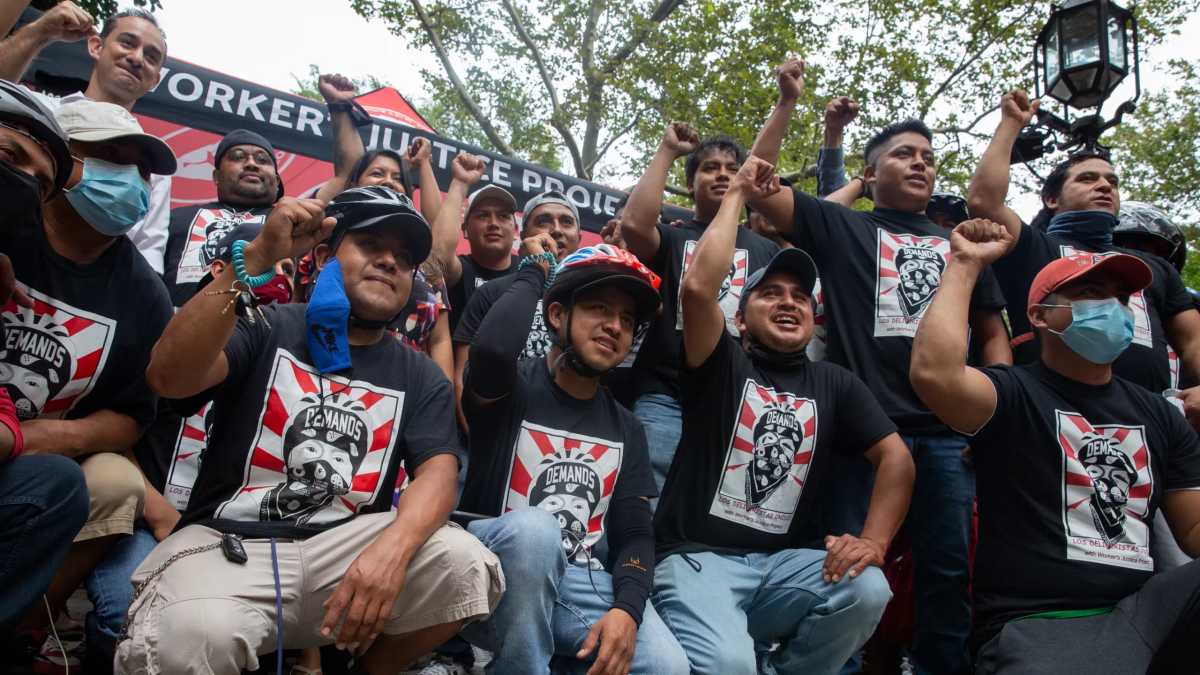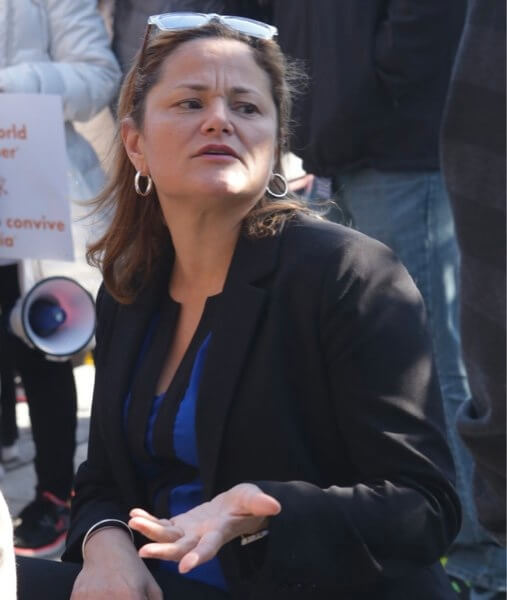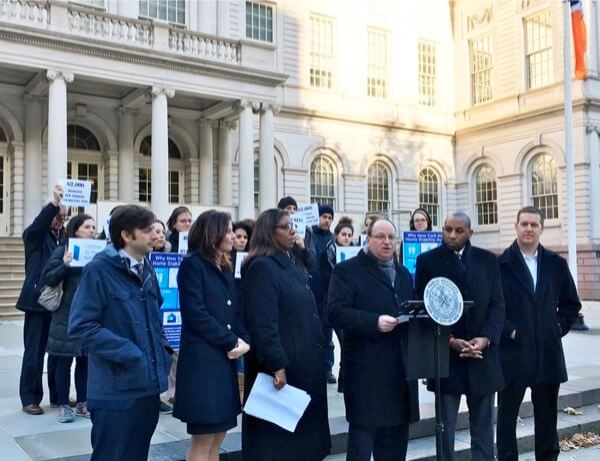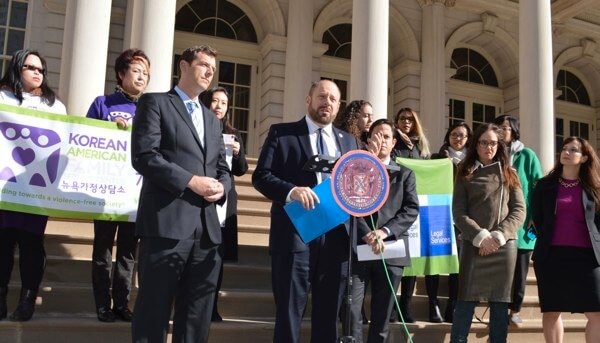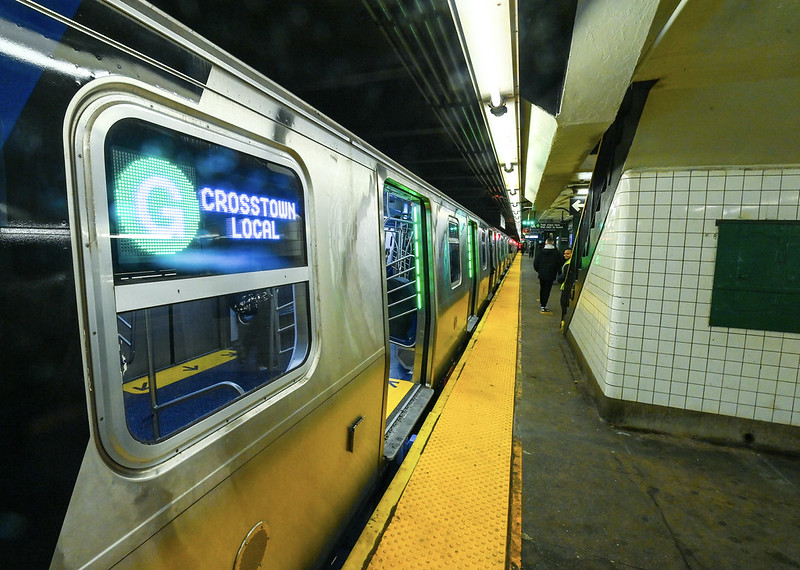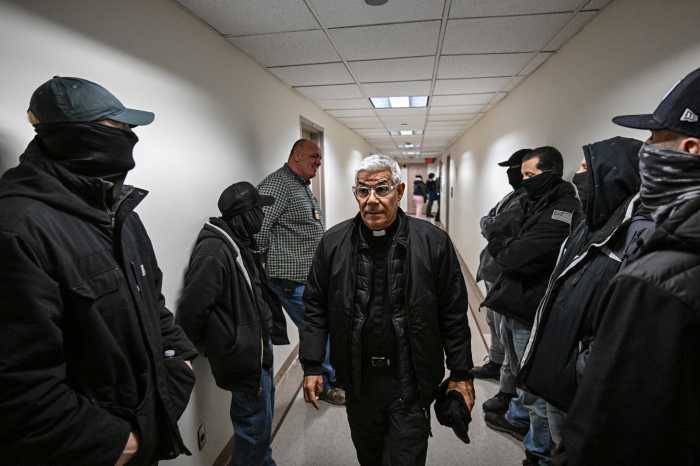This story was originally published on Sept. 23 by THE CITY. Sign up here to get the latest stories from THE CITY delivered to you each morning.
The New York City Council on Thursday approved a slate of bills improving working conditions for app-based food deliverers — becoming the first major U.S. city to set minimum protections for people toiling in the gig economy.
As first reported by THE CITY, the Council’s six-bill package — which includes granting couriers access to restaurant bathrooms, mandating minimum payments per trip and ensuring that tips get to workers — is expected to be signed into law by Mayor Bill de Blasio.
Outside City Hall, dozens of delivery workers cheered as they heard the news, gathering ahead of the vote to distribute helmets to other couriers and help with bike tune-ups.
“This started with the group chat that I created with some compañeros also from Guatemala, and we saw this as a very long, complicated journey. Something in me said: ‘Don’t give up,’” said Sergio Ajche, who helped organize fellow delivery workers.
“We hope this sends a message to other delivery workers in New York and elsewhere: If you work from the heart, you’ll get results,” Ajche, of Brooklyn, told THE CITY in Spanish.
 Claudia Irizarry Aponte/THE CITY
Claudia Irizarry Aponte/THE CITY
Lack of bathroom access became the rallying cry for Los Deliveristas Unidos — a grassroots collective of immigrant food delivery workers that began organizing last winter after pandemic rules shuttered restaurants to indoor dining and closed other bathroom options. The Deliveristas, most of whom travel the city by bike, helped keep New Yorkers fed in a city on lockdown.
“This is a testament to the organizing power and determination of our city’s delivery workers,” said Councilmember Carlina Rivera (D-Manhattan), who sponsored a bill requiring restaurants to make their bathrooms available to app-based couriers or face fines.
Supporters of the legislative package hope that New York City’s action spur other cities to follow, offering a roadmap on how to negotiate a package with input from delivery workers and app-based tech companies making billions off the gig economy.
‘Solid Legal Ground’
The minimum pay rate approved by the Council in a 40-to-3 vote marks the first time a major U.S. city will standardize the working conditions of people toiling for the app-based delivery industry — setting a precedent as some major tech companies embark on a national campaign to clamp down on government regulations.
The bills also included measures that will put limits on how far workers can be asked to ride — an issue that came to the forefront when some delivery people were sent on interborough trips as remnants of Hurricane Ida pounded the city earlier this month.
At least one major food delivery company — Grubhub, which owns Seamless — told THE CITY that it supports the regulations passed by the Council. But the measures could face legal pushback from other industry players.
“These bills are common sense steps to support the delivery workers who work hard every day for New York’s restaurants and residents. Ensuring they receive a living wage and have access to restrooms isn’t just a good idea — it’s the right thing to do,” said Grant Klinzman, a Grubhub spokesperson.
This month, Grubhub, Uber and DoorDash sued the city over an extension of fee caps on restaurants the Council approved in August. San Francisco-based DoorDash sued the city last week over a new law that requires delivery companies to share more customer data with restaurants.
City Council Speaker Corey Johnson (D-Manhattan) expressed confidence Thursday that the new working conditions bills would hold up in court.
“We’re on solid legal ground. We don’t think there is any deficiency in what we’re passing today.” Johnson said. “It wouldn’t surprise me if some of the large — you know, at this point, probably multi-billion-dollar corporations that are making a lot of money in New York City, try to stop this.”
Representatives for Uber Eats and DoorDash did not immediately respond to inquiries on whether the companies plan to file any legal challenges. As trading closed Thursday afternoon, DoorDash’s stock dropped from $220.04 a share to $217.66. Meanwhile, Uber shares closed at $45.48, a nearly 1.4% increase from its opening price.
Relay, a smaller New York City-based food delivery company that works with restaurants, said in a statement that the company “is supportive of the new legislation and we celebrate this victory with delivery workers everywhere.”
The various bills have the backing of de Blasio, who has not set a date for signing them into law, a City Hall spokesperson said.
‘A Seat at the Table’
The City Council vote comes nearly a year after THE CITY first reported workers were beginning to unite over the perilous and exploitative nature of app-based delivery work — including lack of bathroom access, alleged wage theft, insufficient pay, and reports of muggings and robberies.
The improvements delivery workers notched Thursday build on the modest gains gig workers have won elsewhere in the country.
In March, Philadelphia extended paid sick leave to low-wage workers, including gig workers. Seattle established an emergency minimum wage standard for delivery workers during the COVID-19 pandemic and is looking to make it permanent.
The pay requirements introduced in New York by Councilmember Brad Lander (D- Brooklyn) are similar to those already in place to for-hire vehicle drivers, such as those who work for Uber and Lyft.
Though a major victory for the Deliveristas, the minimum pay standards pale in comparison to the rights the workers would have if they were considered full employees as opposed to contractors. But they’re a good start, said Andrew Wolf, a lecturer at the CUNY School of Labor and Urban Studies.
“It’s new and innovative,” for the industry, Wolf said, “and it’s important that governments do this, but it’s not like we’re creating new benefits for workers. Which is important, because we shouldn’t let companies decide who and who isn’t covered by the law.”
 Ben Fractenberg/THE CITY
Ben Fractenberg/THE CITYThe City Council’s bills also reignited discussions over how to classify people who do work for app-based tech companies, but are not considered employees. Instead, workers in the gig economy are designated independent contractors, which typically allows people to set their own wages and hours, something that’s not the case for app-based delivery workers.
“This opens the doors of possibilities for workers,” Ligia Guallpa, executive director of the Workers Justice Project, which represents the Deliveristas, told THE CITY shortly after the vote. “One thing is real full representation [as employees] — that is the first step to start addressing all of the issues and regulating the entire industry, and making sure workers have a seat at the table, that they have the power to decide what goes in and doesn’t go in that contract.
“And why not, forming a union that has the power to actually fight back against these giant tech companies,” she added.
Hochul Eyes Worker Help
Gov. Kathy Hochul said her administration was “absolutely looking” at reclassifying app-based workers, something that has failed to gain steam in New York.
“God bless our delivery workers, too. My gosh. How did we rely on them so much last year? It was incredible what they did. So yes, we’re taking a close look at that,” Hochul said during a news conference in Manhattan.
In January 2020, then-Gov. Andrew Cuomo pitched a nine-member panel that would be charged with coming up with regulations for the budding gig economy. But plans were abandoned as the pandemic hit and attention directed to fighting COVID-19.
Nascent discussions over a state proposal that would allow gig workers to unionize but fell short of classifying them as employees collapsed in May over restrictions that would have barred workers from striking or demonstrating against an employer.
Voters in California approved a 2020 ballot proposition that allowed gig workers to be reclassified as independent contractors, but a trial court last month dealt a blow to tech moguls, ruling that the proposition was unconstitutional.
“Being the first to do it, as one of the most powerful cities of the world and where most of these apps are concentrated, it sends a strong message to the rest of the country that it is possible to regulate this industry, that it is possible to provide rights and protections to app-based delivery workers,” Guallpa said.
“This is what power looks like when workers decide to unite and organize.”
THE CITY is an independent, nonprofit news outlet dedicated to hard-hitting reporting that serves the people of New York.

